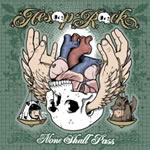|
|
 |
Dusted Reviews
Artist: Aesop Rock Album: None Shall Pass Label: Def Jux Review date: Sep. 4, 2007 |

|
|
|
 |
It's weird to think that Def Jux preceded 9/11 by a year or two. Part of what made it so exciting around the turn of the millennium was the novel way it surveyed the fragmented aesthetics of modernity, staking the chaos of a broken world and proposing proliferation rather than reconciliation. By the time national tragedy brought the rest of us around to a similar wide-angle scowl, the label was already secure in its niche: complicated, ugly hip hop for complicated, ugly times.
Aesop Rock was a perfect fit based on style alone. The density of his Bulfinch-toting rhymes – which usually rhymed, but never easily – was equally evocative and headache-inducing; like the abrasive production of The Cold Vein and later Fantastic Damage, his whole approach to cadence and imagery was constructed to be difficult and, beneath it all, different. But where El-P, Cannibal Ox and the like readily embraced the role of postmodern oracle, Aesop also kept a self-ostracizing edge, a recognition of his own singularity and subjectivity. "This is for the thinkers," he offered in a moment of relative clarity on Labor Days: "This is for the urchins allergic to they own stingers/ This is for the absurd verdict linkers/ This is for that cat at my shows that's always got prophetic opinions but can't remember where his drink is."
Age and popularity have caught up with Def Jux since then, and Def Jux has caught up with Aesop. A few higher-profile but lackluster releases post-Labor Days, particularly 2003's Bazooka Tooth, have seen him become less streetcorner prophet and more public intellectual. His flow is a little smoother, more attentive to the punchline at the end of the stanza; his persona is a little more extroverted, a little funnier, and more at home with the brashness that eventually became the Def Jux brand. It's not that he's gotten any less paranoid, it's that he writes as though he's speaking to, and for, a whole generation of paranoiacs. The success of None Shall Pass is that it proves him right.
Part of it is familiarity. It's a record nobody else could make, if they dared try; it's amusing, but not convincing, to imagine Slug or Gift of Gab trying to pass off "jittery zeitgeist" or "jalopy euthanasia" (okay, maybe Ghostface, but he'd stop well short of "some will arc the funneled Cutty Sark where budding narcs target the gushing heart in the muddy clarks").
Another part is the sound of the album, its unusually low thinkpiece-to-banger ratio: it's not summer jam stuff, but the robust rhythmic sensibility underneath does wonders for the lyrical bombast. Aesop turns in some capable production, but Blockhead is responsible for most of the highlights – thankfully, as his solo instrumental records continue to disappoint – and his palette is laudably expanded, from the idyllic menace of the title track to the perfect grooves behind "No City" and "The Harbor Is Yours." When None Shall Pass drags late in the first act, it's largely due to tracks that seem intended to reprise the contemplative vibe of the Float era ("Fumes," for instance, and the all-around-dumb "Bring Back Pluto"). A few Jukie guest spots, brazen as the production, round out the way the album works best. The John Darnielle verse on "Coffee" remains inscrutable, but agreeable.
Better still, though, that equilibrium with the Def Jux aesthetic is more than just sonic. There's a genuine marriage of the verbose and the erosive, the soapbox and the boombox. Aesop's not gotten cocky so much as taken stock of his strengths and found that linguistic overdrive is his ace. That's why everything here speaks, why it's not just the verses that are iamb-packed but also the choruses, the muttered intros, and especially the scratch breaks ("You look like you've seen a ghost!" and "Capture the flag," to name two). It's about making the semantics inescapable, or about making the density meaningful; either way, the idea is in the right hands. For all his complexity and clutter and claustrophobic literacy, few artists could do more justice to the sound and the fury of the moment, all the jitters of the zeitgeist.
By Daniel Levin Becker
|







